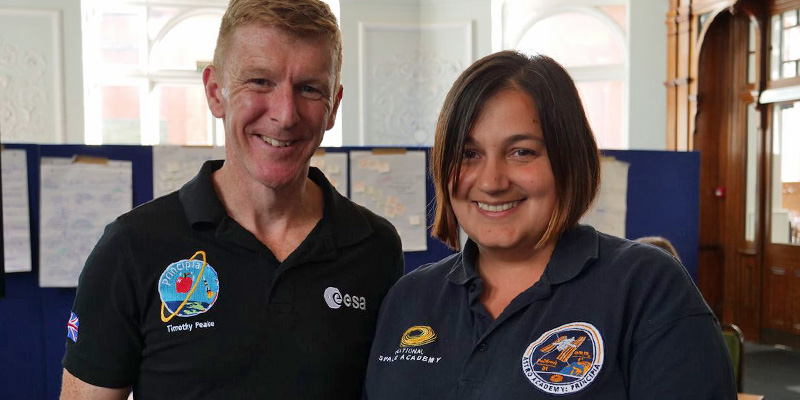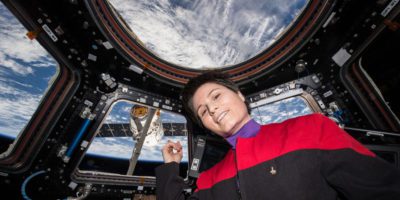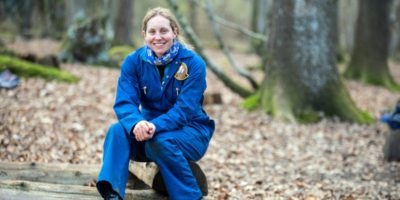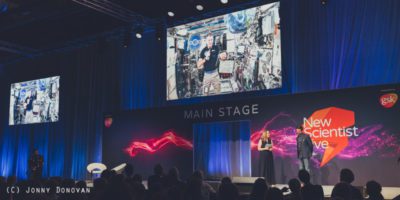Dr. Kierann Shah is the general manager at the National Space Academy in Leicester, where she ensures the successful delivery of the Academy’s funded and commercial programmes through its network of Lead Educators and dedicated core team, both in the UK and overseas. After completing a first master’s degree (MPhys) in physics, Kierann worked at the Multidisciplinary Nanotechnology Centre in Swansea, gaining a research master’s degree and then a doctorate in nanotechnology. Kierann is a member of the Institute of Physics’ Outreach and Public Engagement Advisory Group and the Royal Astronomical Society’s Education and Outreach Committee, and also sits on the Advisory Board of the LEAD Curriculum – a project seeking to engage young people with skills for leadership.
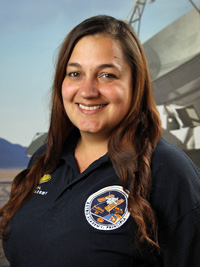
“…It isn’t just astronauts and people in lab coats … We use space all the time in our day to day lives …”
A career in physics thanks to Miss Forbes
When I was at school I always thought I would study art and become an artist or writer, but at age 16 I actually chose to study science A-levels. The turnaround was thanks to one teacher in particular (thanks, Miss Forbes!) who encouraged me to study on my own, raising my confidence and giving me a passion for science, and physics in particular.
I studied physics, chemistry, maths and Latin at A-level, then took physics at what is now Swansea University (formerly University of Wales, Swansea) gaining a first master’s degree. I didn’t know what to do after university and I had a huge case of imposter syndrome, so I went and ran a university bar for a year, then was tempted back into higher education by a funded research master’s degree in nanotechnology.
I had a brief stint as a researcher in nanotechnology after that where I gained my Ph.D. My research career was pretty solitary and again I struggled a lot with self-doubt, imposter syndrome, and even depression (which I still experience from time to time), but I realised that I really enjoyed communicating science and getting people of all backgrounds organised around science events, so I began to look for jobs that would allow me to do that.
I had always had a passion for space – including a few phases of wanting to be an astronaut as a kid – but I didn’t realise how much opportunity there is to work in space related areas in the UK until I started working for the National Space Academy. I started working for them on specific projects part time, which felt like a bit of a risk, but it led to lots of opportunities and now I lead the organisation on a day to day basis.
As someone with varied interests I really enjoy the interdisciplinary nature of space related research and applications.
About the National Space Academy
The National Space Academy is an organisation that uses space contexts to make secondary science more exciting, engaging and relevant for young people. We do this through student masterclasses, teacher training, careers conferences, writing and sharing educational content, and engaging with industry and academia in the space sector.
All of our programmes in schools are delivered by outstanding, experienced subject specialist teachers with a track record of exam success, who are either currently teaching and seconded from their schools, or recently ‘retired’ and working directly for us. We call them Lead Educators and they are absolutely amazing. We have a network of about 30 of them around the UK.
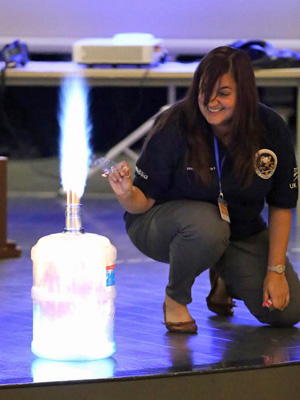
Whilst most of our programmes are designed to help students in the UK we have also delivered programmes for students overseas in places like Europe, China, and the UAE.
We engage very closely with university researchers and companies in the space sector to ensure that we know what the sector’s skills and knowledge needs are, so that we can pass this information on to students and teachers.
We also maintain these links in order to make sure that the space contexts we use for our programmes are linked to the latest developments in space science and technology – we want our students to realise that science and maths are dynamic areas and that discoveries and developments continue to be made.
Lastly, we operate in an advisory capacity to those from the sector who want to know about how to engage with education or outreach. Lots of people in the sector are keen to share their knowledge or experience but their understanding of education is often based on when they were last students themselves, so they don’t always have an insight on the best way to engage with young people or support teachers. We try help to direct their enthusiasm to make it as impactful as possible!
My role
If I’m honest my day to day is a lot of what I call “email herding” and spreadsheets. I’m the person at the organisation who plans budgets and project timelines and, with the hard work of our two administrators, keeps an eye on things like contracts and school bookings. Having said that I do work on strategic planning for the Academy, making decisions about which areas to target with our programmes and how to have the greatest impact on students or teachers.
I spend a lot of time getting to know and understand our stakeholders and funders to make sure that our programmes provide value for them as well.
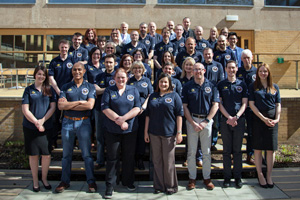
It isn’t all office-based work though – I have had the opportunity to travel for some of our international delivery and I try to say “yes” when I can to invitations to speak at events in schools or space sector conferences. I’ve even been able to deliver some shows and activities in the science areas of a couple of music festivals over the past couple of years which was a pretty nice perk!
The UK space sector – a hidden gem
I think that many in the sector have realised that it is a hidden gem: most of the wider public have a limited knowledge of what the UK does relating to space, and this is a great shame. I am hopeful that the sector will find ways to build on headline grabbing news stories – such as Tim Peake’s mission to the International Space Station – to really inform people about other aspects of space research, exploration, and applications.
The sector continues to need engineers and physical scientists for the development of satellites and other spacecraft, but it also needs computer scientists for this and to make use of the great amounts of data generated and geographers and Earth scientists to interpret much of that data which is about the Earth itself.
The UK sector is very focussed on commercial development so entrepreneurs and those skilled in business, finance, and marketing are also needed for the sector. It isn’t just astronauts and people in lab coats.
We use space all the time in our day to day lives, particularly for communications and navigation. Although I will always get excited about research in cosmology or astronomy, I think some of the most exciting developments in the space sector are finding ways to use satellite data to make good decisions on how to manage the Earth’s environments, including areas such as urban design, monitoring deforestation, understanding weather systems, disaster monitoring, combatting illegal fishing, working in remote locations, and understanding changes in land use, the ocean, and climate change.
These all have impact on the lives of us Earthlings and, since we really only have one habitat in the whole universe that we know we can survive on, we really need to take care of our planet.
STEM engagement for girls and women
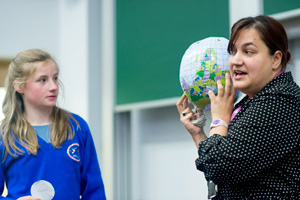
Most of the STEM engagement for girls and women in STEM focusses on what can be done in education, by teachers, or in terms of outreach from STEM workplaces. This is really important and can make a huge difference to individuals or groups, but I sometimes think of it as swimming against the tide.
Girls and women are put off from certain STEM subjects, particularly physics and engineering, because of the messages from wider society that most people knowingly or unknowingly buy into.
I can’t repeat this enough: the gender disparity on STEM subjects is NOT down to an innate ability or predisposition dictated by gender. If it was then the gender disparities would be universal across the world and across different communities in the UK – it isn’t. Everyone should challenge this misconception wherever they find it, let’s change the default setting of society!
Most scientists and engineers are “normal” people rather than geniuses
We have a bit of a culture in the UK of downplaying our own abilities or even celebrating a lack of knowledge or skill when it comes to the sciences or maths. I do think we need to get away from the idea that success in the sciences, maths or engineering is down solely to innate “genius” that’s unachievable by “normal” people.
Everyone finds some subjects harder than others, and success is often down to hard work over ability – and most scientists and engineers are “normal” people rather than geniuses! We also sometimes fall back on the mindset of “oh, maths is just hard. We’re all rubbish at maths,” suggesting that there’s nothing that can be done about it. It is hard, but if it is taught well and students are supported to work on it they can get better!
Teaching is, of course, hugely important. For example, research by a number of organisations shows that the single most important predictor of whether or not a student will go on to study physics at A-level or beyond is their attainment in the subject – which is directly affected by the quality of teaching.
The UK is not recruiting enough physics teachers year on year to meet demand, and so many physics teachers have no background in physics, which may make it harder for them to confidently engage or stretch their students. This has an impact on the number of students of either gender, and particularly girls, that take the subject post-16.
I imagine it’s a similar story for maths. We need to make sure our teachers are trained and supported in their subjects – and given time to focus on their subject teaching over all the other responsibilities they are given – to deliver the best education for young people.
Why gender balance is critical in the space sector
Decisions made in the space sector can have a wider impact on how we use technology, the data available from satellites for example can be used for a whole range of applications. Women must be a part of that decision making and development, otherwise we are being left out.
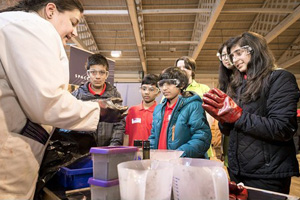
Space activities take global collaboration and can have global impacts, and if we only have men involved in the sector then we are not getting any input from half of the population! It has also been shown that companies with more diverse workforces are likely to be more profitable – I personally think that this is because having a more diverse workforce means that individuals are likely to come at different problems in different ways, increasing the likelihood of coming up with solutions to problems.
Since engineering and a lot of space sector jobs basically boil down to problem solving, the more variety in the minds we can get involved, the better!
How Womanthology readers help
It would be fantastic if Womanthology readers could support our work by pointing any contacts they have who work in schools to our programmes.
If you know a science teacher, let them know that National Space Academy programmes may be able to help them build confidence, raise attainment, and increase engagement among their pupils, as well as raising awareness of STEM career pathways and the UK space sector. We also find that teachers who attend our training feel reinvigorated and have lots to take back to the classroom.
On another level, if any Womanthology readers work for organisations looking for new CSR (corporate social responsibility) approaches or who for any other reason may be interested in helping to fund skills and education programmes, we would love to hear from them. The National Space Academy is a not-for-profit arm of the National Space Centre, which is a charity. The centre is funded mainly through ticket sales and hire of corporate space, but the Academy depends on various funding sources to keep the cost down for schools
Coming up next
We are coming to the end of a few of our key funding agreements, so I’ll be writing bids for new funding phases over the next few months.
The end of the summer term is our busiest time of year for schools’ engagement so my team will be very active across the UK in June and July, and then in August we will be hosting two summer schools for Chinese secondary and university students, as well as a programme of masterclasses for RAF air cadets to keep us busy whilst schools are closed.
In terms of my own development and personal interest I hope to follow up on the Women in Space networking event that I held in March, with the support of the National Space Centre, WIA-Europe UK and the WISE campaign, by arranging some mentoring for some of the attendees and finding ways to build on the event in future.
Katherine, one of our thermal engineers, joined the @UKSpaceAcademy #WomenInSpace masterclass today. Here she is testing out some GCSE students designs ️ #FutureWorkforce pic.twitter.com/PQFIpA6K1G
— RAL Space (@RAL_Space_STFC) March 7, 2018
https://nationalspaceacademy.org/
https://twitter.com/UKSpaceAcademy
https://twitter.com/kierannshah

